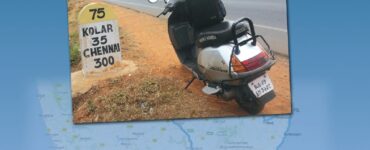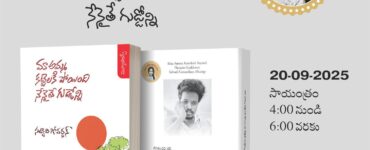Author: Anonymous (from Telugu)
[As per the Hindu Puranic lore, King Bhageeratha made such a long arduous effort in bringing the heavenly-beck to the earth to culminate the funeral rites of his forefathers that it had become a paradigm for any such effort. An anonymous writer, from Rayalaseema, Andhra Pradesh, weaves a beautiful narrative basing on this lore to describe the multi-dimensional, sectarian, conflicting political interests in pre-independent India with a touch of humour. Behind the humorous vein, we should not fail to notice his severe censure of the political milieu, which unfortunately remains the same even today. It’s pity that we know little about the author who wrote such an absorbing story. The story appears in “Modati Taram Rayalaseema Kathalu (1882-1944)” edited by Dr. Appireddy Harinatha Reddy.]
Bitten by travel bug, Bhageeratha left his Himalayan abode and embarked upon the tour of this great countryside. When he entered the semi-arid regions of Bellary and Ananthapuram, districts of Andhra Pradesh, around the village Vidapanakallu, the bus broke down as one of its back Tyres got punctured. The driver announced that the journey would resume late in the evening only after attending the repair work.
Bhageeratha dragged his feet towards the village. Poor Bhageeratha! It was his mother’s ceremony that day and wanted to take care of it in Ananthapuram. But all his plans went awry because of the bus breakdown. Fortunately, the village folk were kind and generous and volunteered to help him, having known his need. The merchants provided for all his needs. Learning that the village Purohit was versed in Vedic mantras pleased Bhageeratha immensely and he visited him at his house. People who brought the provisions after him requested the Purohit to perform the ceremony to the satisfaction of Bhageeratha which he readily agreed. Why wouldn’t he? Particularly when the merchants recommend! And the villagers left to their respective homes.
But there was a hitch. The purohit regretted that he should have thought of it before. The idiom goes that Brahmins start doing things first and then think about how to do it later! So, he approached Bhageeratha and broached his problem.
“Swamin! There is a problem,” initiated the Purohit.
“What’s that?” asked Bhageeratha.
“I can arrange everything for the ceremony. But I am not aware how to proceed with ‘washing the feet’.”
Bhageeratha thought that the Purohit was hesitating because he did not those mantras, and said,
“Don’t worry. I know those mantras and recite them myself.”
“That’s not the problem. The problem is with water. We don’t have water to wash the feet of the brahmins.”
Bhageeratha did not understand what exactly he said. After he explained that nature of the lands how scarce was water there, he understood the predicament. But how could he proceed with his mother’s ceremony without washing the feet of the brahmins first? So, he was hapless and had to abandon his mother’s ceremony for that day. The King-sage understood the enormity of water scarcity of the area. ‘Tut! Instead of bringing the Ganges from heaven only to waste away its waters meld into the salty sea, it would be more fruitful to provide for water to these arid lands!” He decided within then.
Bhageeratha again started penance for Lord Shiva. Lord Shiva appeared and asked, “What do you want this time?”
“Shake your matted hair once to let water spill onto the Rayalaseema lands. They don’t have water even to wash their feet,” he prayed.
Then Lord Shiva grinned condescendingly and said, “Hey, King-sage! You are speaking as if we are in Krita Yuga. I used to keep a long mount of matted hair then. And I could reserve the Ganges. But those days have gone. Watch my crown. I had a neat crop of hair. Except for the touch of Himani cream, there is not a drop of water on my head.”
Then, Bhageeratha raised his head. What Lord Shiva had said was true! His hairline so clear and neat. He had a recent shave and to keep his moustache stiff and erect they had a dab of eucalyptus oil. Instead of ash, he had applied face powder all about him.
Bhageeratha realized it was useless to stay there anymore and left for the abode of Lord Vishnu.
*
Afterall, Lord Vishnu had the reputation of the Ganges being born at his feet.
He would not say no to my request, and he could easily divert the Ganges towards Rayalaseema, thought Bhageeratha.
Entertaining great hopes, Bhageeratha reached Lord Vishnu’s abode and placed his request.
Bhageeratha noticed the same condescending grin he saw with Lord Shiva, while drawing Bhageeratha’s attention to his feet. Bhageeratha looked at Lord Vishnu’s feet in wonder. He was wearing shoes. That too after wearing socks. There was no heavenly (sorry, earthly) chance of moisture being there. But then, even if Ganges were to spill out of those shoes, could he reckon the waters pious? He was in a dilemma. So, he returned … back to earth.
*
He thought that it would be better to pray for Goddess Ganga and take her to the arid regions of Rayalaseema. Goddess Ganga appeared before him. “Let me watch the countryside in a feminine form before I make any promise,” she said. As Goddess Ganga walked behind Bhageeratha, they came across many rail-road crossings. Looking at them she asked, “They are all so lofty. How could I cross these barriers?” she asked. “Why? Do you think they stand your fury? They are just hollow heaps stuffed with soil.” He assured her. At last, they reached Bellary and took the road to Ananthapuram. Eight arrack lorries passed them by. The foul smell heralded their arrival one mile in advance. Ganga lost her nerve and verve. Bhageeratha was thoroughly disappointed. Goddess Ganga said, “This is the land of my rival (co-wife) flows freely. I can’t stand here for a moment,” she declared and disappeared towards Varanasi. And the Goddess of Arrack, Ellamma, guffawed bitterly as Goddess Ganga took to her heels.
“Beware, if you enter these parts again!” She warned.
*
Bhageeratha was perplexed. He sought the advice of Lord Brahma.
“There is no chance of Ganga ever coming to those parts,” Lord Brahma declared, “but, take heart. Tungabhadra is nearby. Somehow you get elected to the assembly and build an Ayacut over the river and divert the waters to Rayalaseema. There is no better way than this.”
*
Bhageeratha got elected to Delhi assembly and moved a resolution to build a barrage over Tungabhadra. But there was nobody to second his proposal. And a government member raised an objection arguing that the matter was a state subject and the Indian government had nothing to do with it.
Bhageeratha resigned to his membership of Delhi and wanted to contest as a member of the Chennai state assembly. He wanted to represent Bellary district. Lingayat’s are a majority in that district. When he announced his candidature, all Lingayat’s got terribly angry with him because, it was he who brought the Ganges lying at Vishnu’s feet and poured over the head of Lord Shiva. That was a sacrilege. They accused him of being anti-Shiva and were about to take revenge. Bhageeratha ran away from that place and came to Ananthapuram and filed his nomination for Ananthapuram.
*
Electioneering was in full swing. When he sought people’s vote in support of him, they started asking him the same question everywhere: “Are you a Kapu or a Kamma?” When he replied that he was neither of the two, they refused to vote for him.
“I shall keep your tanks full of Tungabhadra waters,” he promised.
Unless a Kapu brings those waters, we don’t divert it to our fields,” protested Reddy’s.
“If anyone other than our caste brings waters, we break the bunds to waste it away but never use it for our purpose,” declared Kamma’s.
Bhageeratha approached brahmins for their support.
“Because you belong to the lineage of Emperor Sagara, don’t expect votes from brahmins,” they replied.
Bhageeratha went to Kshatriyas for support.
“You became a Rishi and joined the band of brahmins, we are not going to vote you,” they said.
All attempts of Bhageeratha, thus, had come to nought.
*
Finally, He hit upon a brilliant idea to seek votes.
There appeared in his appeal seeking votes these following lines:
“Of late, Congress people are making Dharnas and protests in front of Arrack shops to prevent sale of Arrack. The government is also preaching temperance through their committees. If I get elected, I shall see that these Temperence Committees are dissolved. I work against Congress. I am a juicehead. I pray all patriotic juiceheads to support me with their votes.
Faithful Barfly
Bhageeratha.”
And lo! He got votes in oodles. All toddy-tappers worked hard to procure votes for him. Even Kamma’s and Kapus voted for him. The weavers and Bhavsar Kshatriyas voted for him. Brahmins and majority of merchant caste voted for him. Even Sub-Inspectors canvassed for him. Polling officers, while declaring that they had voted for others, voted for Bhageeratha secretly. And where they could not avoid, they rendered their votes invalid, failing to comply with one or the other required formalities. And the Arrack Contractors opened an outlet close to the polling booths and supplied a pot of free arrack to everyone who voted for Bhageeratha. And special arrangements were made to polling agents for supply of arrack. Bhageeratha won by a huge margin. Others lost their deposits. On the day of counting, when Bhageeratha was declared elected, all toddy-tappers carried Bhageeratha on their shoulders and arranged a feast.
*
The first meeting of the new Assembly was convened. Bhageeratha did not raise the issue of Arrack. What he wanted was the Tungabhadra Project. It was only a means to get elected. That’s all. He made a proposal for the Tungabhadra Project. Somebody eager to find his name appear in papers seconded him. Accepting his proposal, the government had constituted a committee to negotiate with the Nizam and made Bhagiratha its President.
Bhagiratha got an appointment with Nizam and made his proposal. “We are pleased to know from you that the river Tungabhadra flows through our Kingdom. But we should make sure we commit. “We shall get the information from our Diwan and shall let you know,” said the Nizam.
Bhageeratha stayed behind to meet the Diwan. “We are trying to ascertain the facts,” was the stock reply from Diwan. Finding their eternal attempt to know whether Tungabhadra flows through Nizam’s lands vexing, Bhageeratha got disheartened and left for Madras again. After some time, the Committee members received a communication from the Nizam that they would allow Tungabhadra waters in exchange for Berar.
Bhageeratha placed Nizam’s proposal before the government. Stating that Berar issue was a matter under the purview of Government of India and left it at that. After some more time, Bhageeratha came up with an amended resolution for the Tungabhadra Project at a place under British India instead of Nizam State. The Government formed an expert committee. They took measurements and the engineers made estimates. Bhageeratha grew impatient and asked why the work had not commenced yet. The government washed off its hands saying coolly that the Project was not viable since return on investment was not commensurate with the capital investment.
“You have been making crores of investment for construction of office buildings here and in Delhi. What is the return of Investment on these?” Then the Speaker in the Chair called for “Order! Order!” And as Bhageeratha was about to say something, he was necked out by the police. Bhageeratha was enraged. “I was able to bring the Ganges from Heaven but failed because of these Assemblies to let the Tungabhadra waters flow,” and started running towards the Himalayas. And the newly elected members of Assembly from Bellary and Ananthapuram who saw him running heckled at him turning their moustaches, “Bhageeratha! You are a failure. See how we will succeed where you failed. This is Kali Yuga.”
Petrol Company people file a case against him stating that he disappeared without paying the petrol expenses for his electioneering.
*
I suddenly got up. Recollecting the dream, I reasoned it was all due to sitting late into the night reading the story of Emperor Sagara. An inadvertent smile escaped my lips.
***
(The story was first published in the magazine Sadhana Patrika, 20th September 1930.)









Add comment